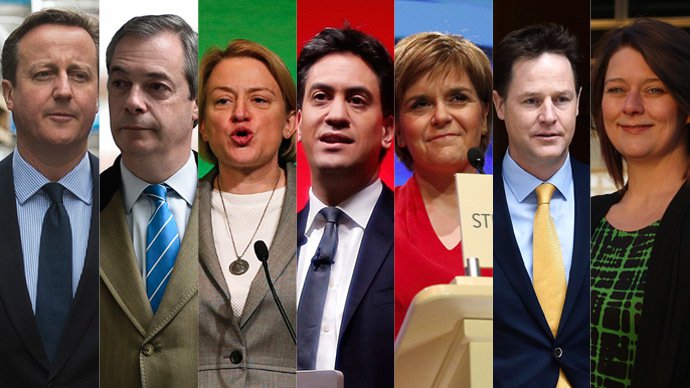Election Manifestos: The parties’ LGBT policies compared
By Ben Kelly

Over the past two weeks, as the main parties have been unveiling their election manifestos, we’ve been keeping a keen eye on the LGBT-specific policies each have included. Now, with all the information laid before us, we can examine which of the parties have strong visions for the future of LGBT rights, which have a couple of ideas they might trot out, and which don’t have any at all.
TOP SCORERS: Labour, Liberal Democrats, Greens, Plaid Cymru, Sinn Fein, Alliance
This collection of left-wing, liberal parties, all have substantial sections of their manifestos devoted to the many issues that spring from LGBT equality – with the Greens scoring highest. They all support the right to equal marriage and legal support for those couples, as well as tackling all forms of LGBT related bullying in schools.
The plans to overturn historic ‘gross indecency’ convictions and to promote LGBT tolerance globally are supported by a number of the other parties including Labour, as are changes to the laws on gay men donating blood, and a strengthening of laws around hate crime. Support for trans people features in the manifestos of the Greens, Sinn Fein and Plaid Cymru – who will campaign for a Gender Identity Clinic in Wales to cut down waiting lists.
Bonus points for the Lib Dems, who want to make homophobic chants at football games illegal, and permit humanist weddings. Both Sinn Fein and Alliance are committed to opposing the DUP’s ‘conscience clause’ in Northern Ireland, which would permit anti-gay discrimination in the purchase of goods and services.
The Liberal Democrats have already said they would prop up a Labour government if the figures leaned in Miliband’s favour, and certainly they wouldn’t clash over any of the above issues. Likewise, the Greens, Plaid Cymru and Alliance may only have 5 MPs between them at present, but all are share much common ground with Labour and the Lib Dems, and 5 could be just the number needed to tip Miliband over the crucial 326 mark. Sinn Fein have 5 MPs also, but don’t take their seats in Westminster.
AVERAGE SCORERS: Conservatives, SNP, SDLP, UUP
These parties all reference LGBT rights, but are either unspecific, or come up short in their proposals. The Conservatives say they will review legislation over hate crimes – mentioning sexuality and gender identity – but their promise to keep tackling bullying in schools mentions nothing specific about homophobia. Their main LGBT promise is pardoning the historic ‘gross indecency’ offences. They sum up their plans by saying they will “champion equal rights and correct past wrongs”.
The SNP have a strong LGBT record, having supported same sex marriage in Scotland, and with their LGBT wing Out For Independence holding the biggest such conference of any UK political party earlier this year. Their only promise in this manifesto is the creation of a special envoy within the Foreign Office to promote the rights of LGBTI people around the world – a policy they share with Labour and most of the above parties. The SNP are of course happy to support a Labour government, and would sit happily with the other aforementioned parties if necessary, but if Labour did bring the SNP into government, the current polls imply they wouldn’t need a third party to hold a majority.
Northern Ireland’s secondary nationalist and unionist parties, SDLP and UUP respectively, merely pay lip service to LGBT equality. The SDLP say they are “committed to defending and campaigning for equality and human rights across all sectors”, while the UUP want to give young people “a better understanding of sexual and cultural diversity through age appropriate teaching.” They have only 3 MPs, but it’s worth noting that the SDLP is a sister party of Labour, and would be their first go-to for a coalition. The UUP however, currently have no MPs.
WOODEN SPOON: UKIP, DUP
Neither UKIP nor Northern Ireland’s DUP have included any reference whatsoever to LGBT rights in their respective manifestos, and that’s not surprising. These were the only two parties opposed to same sex marriage – something the DUP are still blocking in the Belfast Assembly. The two have further common ground in that they both want the UK out of Europe, and they both want increased spending on the armed forces.
A mock website set up by the Lib Dems imagined ‘BLUKIP’, a Conservative-UKIP-DUP coalition which would see same sex marriage reversed, and while it was all a bit farcical, there is a very real prospect of David Cameron finding himself reliant on these two right wing, anti-EU parties. UKIP may only scrape a handful of seats in the end, but the DUP are certain to retain all 8 of theirs, and perhaps win a 9th. As a regional party who are strongly pro-Union, they are an appetizing alternative to the separatist SNP – so even Labour could find themselves asking for their support.
Read more of Attitude’s election coverage in the new issue out now on digital and in print.



